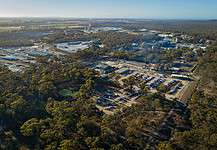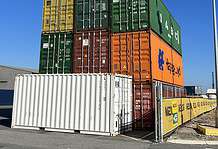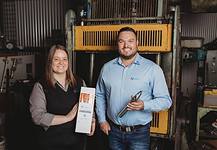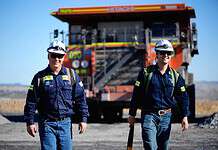BY: JESSICA CUMMINS
The number of Indigenous Australians working in the mining industry has more than doubled since the 1990s. The Australian Mining Review speaks with WA Aboriginal Affairs minister Ben Wyatt and PwC about the challenges and major developments that have shaped the sector.
GOVERNMENT initiatives such as the Federal Indigenous Procurement Policy and the WA Aboriginal Procurement Policy have played a key role in facilitating the prosperity of Indigenous businesses.
Comprising three main parts, the Federal Procurement Policy ensures a target of three per cent of Commonwealth contracts were awarded to Indigenous businesses; ensures a mandatory was set aside for remote contracts and contracts valued between $80,000 and $200,000; and a minimum Indigenous participation requirement in contracts valued at or above $7.5 million in certain industries.
Within its first two years of operation from 1 July 2015 to 30 July , 2017, 4880 contracts were awarded to 956 Indigenous-owned businesses with a total value of $594 million.
This cumulative figure included $24 million in contracts awarded to Indigenous businesses in 2015–16 that was not reported until 2017.
The latest census data revealed a 22 per cent growth in the number of Indigenous Australians working in the mining industry – with numbers rising from 5435 in 2011 to 6654 in 2016.
The Prime Minister’s 2018 Closing the Gap report confirmed that although the mining boom and bust cycle saw significant disparity in economic conditions across States and Territories, the mining industry itself was employing significantly more Indigenous Australians than in previous years.
PwC Indigenous Consulting WA State director Kate George said Indigenous businesses had been on a trajectory since the 1990s when the first Aboriginal training program was formed – before Native Title and the Mabo decision was enacted.
“We have come a long way since those days of distrust – interestingly the employment strategy came out of an enquiry that the Commonwealth government commissioned looking at the training situation and need for Aboriginal employment in 1989,” Ms George said.
“Rising out of the Commonwealth government’s Aboriginal employment strategy, the government began providing funding particularly for major employers to assist with training Aboriginal people to get people ready to apply for employment in the resources industry and out of those employment strategies the idea of contracting opportunities arose.”
While it was not mandatory for mining companies to award contracts to Indigenous owned businesses, companies such as FMG, Rio Tinto and BHP were leading the way.
FMG recently awarded more than $6 million in contracts to two WA Aboriginal businesses through its pioneering Billion Opportunities program.
FMG chief financial officer Ian Wells said the contracts showed the company was committed to supporting local businesses in part of its procurement process.
On 6 June, Rio Tinto entered into a partnership with Pilbara business North West Alliance (NWA) with a multi-million contract that will see the contractor undertake waste management services across 16 of Rio’s mine sites.
Ms George said it was a “known fact” that Indigenous businesses have gained their largest opportunities from the resources sector.
“There is policy incentive now and encouragement like we have never seen before – the foundational building blocks have come out of the resources industry, which has exposed Indigenous contractors to the commercial world,” she said.
“We didn’t have any of that before the 1990s, it has really been quite phenomenal.”
WA Aboriginal Affairs minister Ben Wyatt enforced the State Aboriginal Procurement Policy on 1 July this year, which aims to achieve three per cent of contracts awarded to Indigenous owned businesses by 2021.
“This policy creates the potential for joint-venture partnerships between Aboriginal and non-Aboriginal businesses to create scale and enable participation in some of the State’s larger contracts,” Mr Wyatt said.
Mr Wyatt said the government had seen several successful Aboriginal businesses emerge on the back of the mining boom, with the support of the mining sector.
One such business was leading WA Indigenous contractor and winner of the 2018 Australian Mines and Metals Association (AMMA) National Indigenous Employment and Retention award, a joint venture between Njamal Services and Pilbara Resource Group (NPJV).
After initially starting with only three employees, the company had grown to more than 60 with $15 million in contracts under its belt in two years.
The business has also helped to establish four other businesses run by traditional owner families with the aim of each company eventually being a standalone business.
“We have government policies such as the WA Aboriginal Procurement Policy which helps getting more Indigenous companies off the ground; they might get their first break through providing a service for the mining industry,” Ms George said.
“But we also have regional policies such as the WA Jobs Act where the private sector has to release a local participation plan in their tender responses.”
However, Mr Wyatt said although mining companies had paved the way in engaging with Indigenous businesses, challenges still existed.
“One of the challenges, both for government and for industry when engaging Aboriginal businesses is to provide adequate support and guidance to navigate their way through complicated tendering processes,” he said.
“The McGowan Government has also committed to working with Aboriginal businesses to assist them in increasing their capacity and allowing them to compete for large contracts, both with government and the private sector.”
Ms George said contracting opportunities were written within the legal agreements mining companies have with Indigenous groups for land access agreements.
“There is an incentive there for opportunities to be provided, but more importantly it has been demonstrated that Indigenous contractors are more likely to employ Aboriginal people,” she said.
“It’s a win win-win situation – there is a snow ball effect in all of this.”
AEMEE celebrates contractor success
INDIGENOUS contractors from the mining industry rubbed shoulders at the 14th annual Aboriginal Enterprises in Mining, Energy and Exploration’s (AEMEE) mining conference and inaugural awards dinner in October.
The two day event – which aimed to advance opportunities for Indigenous businesses – saw about 53 speakers present on individual business insights and experience.
Key note speakers included the 2018 WA Australian of the Year Dr Tracy Westerman, University of Melbourne Australian Indigenous studies foundation chair Dr Marcia Langton, and founder of The Liberators International Peter Sharp.
AEMEE chairperson Derek Flucker said the conference provided an opportunity for Indigenous businesses to gain new work, secure networking opportunities and provide learnings for best practice in engaging with Indigenous businesses.
“The resources sector is clearly a big spender in this space with more than $10 billion worth of investment over the past 10 years,” Mr Flucker said.
“There are a number of stories of Indigenous businesses doing well on the back of this huge investment and a number of great stories from resources companies that have supported and developed very successful Indigenous economic development programs.”
Winners of this year’s awards included Moec, Far West Coast Investments, and Rio Tinto.























































